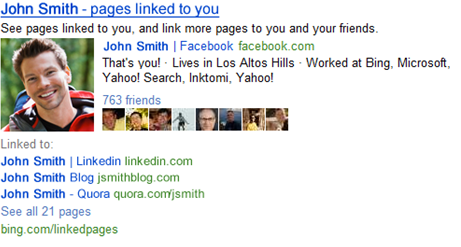Microsoft adds another Facebook tie-in to Bing search

Microsoft rolled out on February 22 of a new Bing feature known as Linked Pages, which allows users to choose links related to them to appear in their search results.
The new option is in beta and is available to testers in the U.S. only right now, the Softies said.
"Now your friends looking for you online can find what you want them to find. You can also link pages to your friends to help them shine on Bing as well," said Microsoft officials in a post on the Bing Community blog.
To start linking, users need to log in using their Facebook IDs to bing.com/linkedpages. The initial page asks users to allow Bing permission to post to Facebook. A Microsoft spokesperson said users cannot skip this step the first time they log into Linked Pages.
To make this work, "you must be logged into Facebook on Bing. If not already logged in, you will be prompted to log in when you visit bing.com/linkedpages," a spokesperson said.
Users can add links to their home towns, schools, employers, personal Web sites, organizations or even "just sites you like," according to the post. Users also can suggest links about their friends, but those won't show up automatically. "We’ll ask your friend for permission first, and then once granted post on their Facebook Timeline that they were linked on Bing," according to the post. Users can remove links they added or that others added about them at all times, according to the Softies.
Today's tie-up between Facebook and Bing isn't the first. In May 2011, Microsoft announced the ability of Bing users to receive personalized search results "based on the opinions of your friends" by signing into Facebook. Users could see what their Facebook friends liked on the Web, making their searches more "conversational."
So how are these Facebook-Bing tie-ins different from what Google is doing with Search Plus Your World? So far, Microsoft, unlike Google, doesn't seem to have set off the privacy/antitrust watchers with its approaches. Microsoft's strategy definitely seems to me to be more sensitive to the idea of opt-in. Any of you readers have thoughts on which approach you prefer and why?
